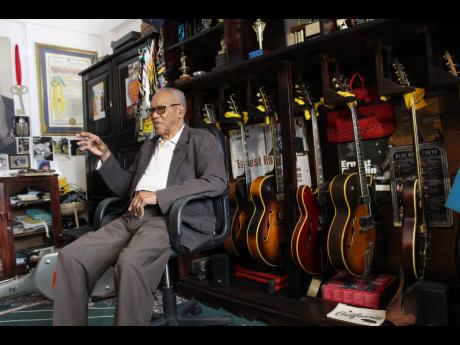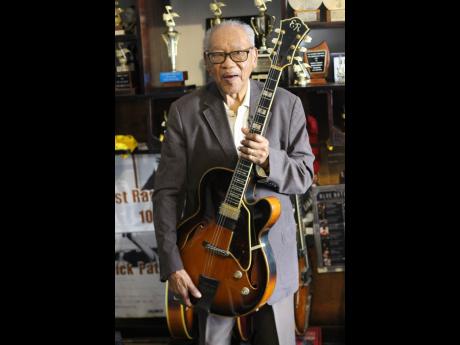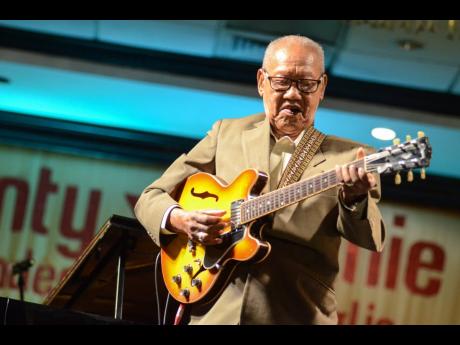5 Questions With Ernie Ranglin
When Rolling Stone magazine last October unveiled its official list of The 250 Greatest Guitarists of All Time, sitting at 179 was Ernest ‘Ernie’ Ranglin. The 92-year-old musician is still going strong and still picks up his guitar for special occasions. Ranglin’s bio states that he established his career while working as a session guitarist and music director for Studio One and Island Records. On many early ska recordings, it was Ranglin who played the guitar and he is credited with helping to create the rhythmic guitar style that defined the form. Ranglin is noted for “a chordal and rhythmic approach that blends jazz, mento and reggae with percussive guitar solos incorporating rhythm ‘n’ blues and jazz inflections”. Theophilus Beckford, Jimmy Cliff, Monty Alexander, Prince Buster, the Skatalites, Bob Marley and the Eric Deans Orchestra have all benefited from Ranglin’s genius.
1. What is your message to young musicians who look to you as a role model?
First thing is to live decent and keep good company. Keep good friends … people who have ambition ... people who can help you to think well and do well. That is what is important. The people you associate with, that is what will help you to reach further in life. The bad company ... that is what will put you down and the good company that is what will put you up.
2. What has inspired your accomplishments as one of the greatest to ever do it?
I left Bodin College at 14 because of the music. I went there to study to get into the academics but I loved cricket a lot and they didn’t have a playfield so I had to go other places and play. I got lines to write as punishment and I couldn’t write any more lines, so I left. I bought music books. I studied from books and that’s how I get my inspiration. At about 16 I started in the Val Bennett band and then the Eric Deans band. The first place I went was Haiti and then the Bahamas where I developed a lot. The thing that helped me a lot was when I went to America and I was playing swing music. When I came back to Jamaica I had to fight my way around because I didn’t have a manager to help me find my way around. After I did the Millie Small … My Boy Lollipop … I went to England and come back and then I went on tour with Jimmy Cliff. We went a lot of places…. Hawaii, Japan ... I was being exposed. I used to do some jazz with Monty Alexander and eventually people started to know me and I got a manager for myself that I could tour the world and from there I expanded myself
3. As a musician who has lived through the changes in Jamaican music, do you have a favourite era?
I like the mento with Baba Motta and people like those. As a little boy I would go down to Spanish Town Road and listen to the people who played the pop tunes in those days. We would learn the tunes from them. My favourite era in America was bebop and swing music. Charlie Parker was one of my great inspiration and Dizzy Gillespie. I used to love those big bands like Duke Ellington. [I did] ska with Millie Small and when I came back I did reggae music at Duke Reid.
4. How do you feel about the Rolling Stone honour that you received last year?
I feel very pleased about it ... but they don’t know how this thing begin in Jamaica. It’s a pity that they didn’t know who was the person who started the reggae music. I noticed that they honour Jimmy Cliff and they honour Bob Marley. Jimmy Cliff was the person who did a movie and I had to be his musical director. He was doing a lot of tours for his movie The Harder They Come. We went all over the world and one of the places that gave Jimmy a good thing was when we went to Japan. He was the first one to carry reggae to Japan. The next thing I have been feeling bad about is that I was the one who brought in reggae and ska music and I notice that they [are] always giving the kudos to Bob Marley and Jimmy and I am the man who brought in this stuff.
5. Which guitarists, past and present, do you admire?
Oscar Moore was one of the great guitar players. In 1955, I was rated number three by Dizzy Gillespie. America was the place that I tried to follow with the music, so most of the musicians were those in America that I tried to follow. I listened to records and tried to keep up what was going on. One of the great things was when ska music was created and I went to England with the knowledge of jazz that I learnt. From then on I went all over the world. Now, I am getting so young and I thank God that I get to go to all of those places.



